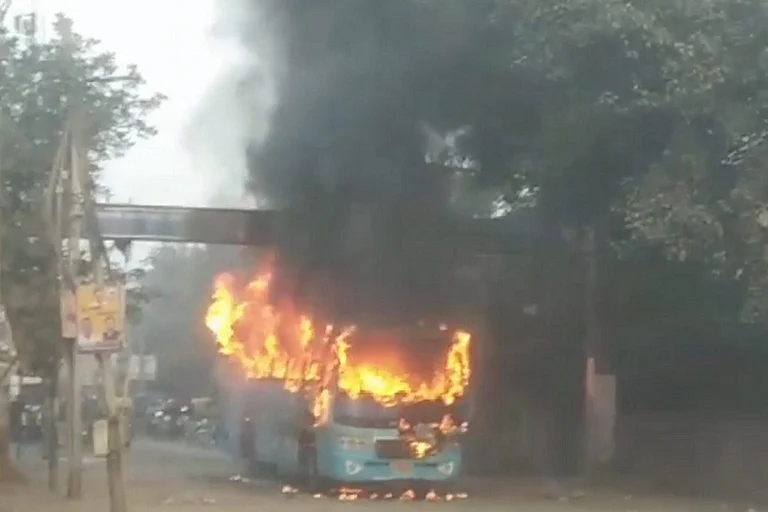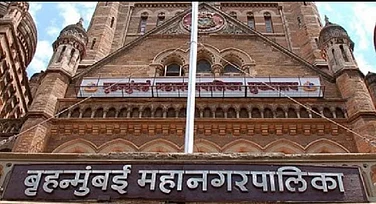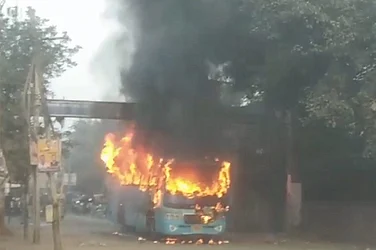Even though there are no elections in sight for the Jammu and Kashmir (J&K) Assembly after nearly five years of the Governor’s rule, it has not put a full stop to the political activities of parties in the state. At least one political rally is being organised every day somewhere in J&K. In these rallies, political leaders urge the government to hold the polls in J&K and they allege it is the Bharatiya Janata Party (BJP) that is delaying elections in the restive region fearing defeat.
After the abrogation of Article 370 on August 5, 2019, the BJP leaders assured the restoration of statehood to J&K and holding elections for the J&K Assembly. Manoj Sinha, the Lt Governor of J&K, often gives political statements targeting the National Conference (NC) and the People’s Democratic Party (PDP).
“How long will they delay the polls? One day they will have to hold the elections and give power back to the people. Whenever elections will be held, we will contest,” says former chief minister and NC president Farooq Abdullah. He laughs at Lt Governor Sinha’s political statement, who often asks people to be aware of the gimmicks of political leaders. “One day he will have to leave J&K like Satya Pal Malik,” he says.
While former Chief Minister Mehbooba Mufti’s party is not talking about elections, her party holds the BJP responsible for “persecuting Kashmiris” and putting thousands of people in different jails across the country.
“If we had resources, we would bring back those youths who are languishing in different jails across the country. They are suffering. Their parents are unable to even meet them, leave aside fighting their cases,” Mehoooba says. “This government doesn’t give two hoots to the Constitution of the country and runs the government according to the BJP’s agenda,” she adds.
“Every day, NIA, SIA and other agencies are carrying out raids across Kashmir and the G-20 meetings in Srinagar are presented as a trophy. Let them restore the basic fundamental rights of Kashmiris,” says Mufti.
While political parties are not revealing their poll strategies yet, their previous election manifestoes had been politically radical and Article 370 was prominently figuring in them.
Take the 2014 manifesto of the NC. It describes Article 370 as a “foundation on which the relation of the State (J&K) with the rest of the country is based.” “This Article cannot be tampered with,” it says. It urges the resumption of talks between India and Pakistan for the prosperity of the “South Asian Region.”
The NC was seeking votes on the performance of the Omar Abdullah-led NC–Congress coalition, which literary drowned in the great floods of 2013 when the chief minister had no office to sit and he was operating from a hotel.
The 2014 manifesto, while enlisting Abdullah’s performance as chief minister, says it completed the Mughal Road, provided one lakh jobs to youths, established 3,000 entrepreneurship units, and laid an “edifice to generate 9,000 MW of energy. It also promised that it would take steps to ensure that the floods are not devastating in the future. The manifesto laid a long development roadmap in tourism, agriculture, horticulture and other sectors.
However, the party goes back to the Naya Kashmir document of 1944. It is considered as a socialist and revolutionary document. Experts on Kashmir like Andrew Whitehead see it as a very radical and pro-woman document, which calls for universal franchise, freedom of expression, freedom of the press, land to the tiller, state ownership of the industry, ending agrarian debt, the ability of women to work in all trade and professions. “It is an ahead-of-time document,” Whitehead says.
The PDP’s election campaign in 2014 was based on keeping the BJP at bay. The party had distinctly mentioned self-rule in its manifesto. It said: “Self-rule document will be the guiding framework for resolution (Kashmir).”
The self-rule document of the PDP included closer ties across the Line of Control, making borders irrelevant, complete connectivity (between Kashmir and PoK), economic and social integration of two regions, regional free trade area, common economic market, joint regulatory commission on trade and tariffs, constitutional restructuring and restoration of powers of the state assembly. The abrogation of Article 370 and the return of Kashmiri Pandits to the Valley were the main highlights of the BJP manifesto.
The 2014 Assembly elections in J&K held in multiple phases from November 25 to December 20, 2014, didn’t give a clear majority to any party. The PDP secured 28 seats and the BJP got 25 seats out of the 87 seats.
After the polls, these two ideological parties went into a huddle for almost two months. And after a long negotiation, they left their manifestoes behind and came up with a Common Minimum Programme (CMP). The CMP assured the PDP to put Article 370 in deep freeze for six years of their coalition government. The parties agreed in the CMP that “the present position will be maintained on all the constitutional provisions pertaining to J&K, including the special status in the Constitution of India”.
Later, when Mufti Mohammad Sayeed was sworn in as chief minister, in his first press conference, he also gave credit to Pakistan, Hurriyat and militants for the peaceful conduct of the elections unnerving the BJP.
The PDP argued that the PDP-BJP alliance is for the good of J&K and its benefits would be reaped by future generations as it will bring the two regions, Kashmir and Jammu, closer.
As Chief Minister of the coalition government after Mufti Mohammad Sayeed’s demise, Mehbooba Mufti, in August 2017, stated that Prime Minister Narendra Modi has given “100 per cent assurance” to the PDP-BJP government’s agenda of alliance or Common Minimum Programme.
However, a year later, on June 19, 2018, BJP leader Ram Madhav, the architect of the PDP-BJP alliance, while addressing a press conference in New Delhi, announced the withdrawal of BJP’s support from the PDP saying it had become “untenable” for the party to continue being a part of the coalition government in J&K.
After the abrogation of Article 370, a Gupkar declaration came up. Parties like the NC, PDP, CPI (M), Congress, People’s Conference and Awami Ittehad Party (AIP) of Engineer Rashid issued a joint statement describing the abrogation of Article 370 as grossly unconstitutional and a challenge to the basic identity of the people of J&K. After the District Development Council (DDC) polls held in 2021, People’s Conference left the alliance.
With Article 370 abrogated, J&K downgraded to a Union Territory and Ladakh separated from it forming another Union Territory, the uncertainty continues about the J&K Assembly election. NC spokesman Tanvir Sadiq says the election slogans like J&K autonomy and the party’s manifestos are still “dear to us.” He adds: “But things have changed drastically politically and geographically in J&K. This time, I cannot talk about something while I am J&K. J&K is J&K UT. It is not J&K state. Right now, elections are important to us.”
Naseer Ganai in Srinagar
(This appeared in the print as 'The Question Is: When Next')


























